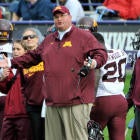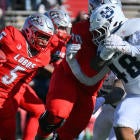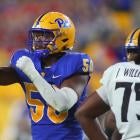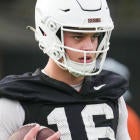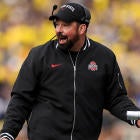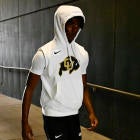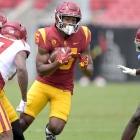Minnesota has fired Tracy Claeys as head coach, CBS Sports' Dennis Dodd has confirmed.
A decision on Claeys' future was set to made official this week, following a review of the program. Claeys was promoted from interim coach to full-time head coach after Jerry Kill's retirement and led the Gophers to a 9-4 record and a bowl victory over Washington State. Claeys went 11-8 as the Gophers' coach, including 2-0 in bowl games.
Athletic director Mark Coyle said in November that Claeys would be back in 2017, but released a statement after the bowl win suggesting that a review was coming. This week was the first time both Coyle and Claeys were back in the office, and now Minnesota is set to be the next Power Five job open.
Coyle, in a statement released by the school, cited the need for "strong leadership" to address "challenges in recruiting, ticket sales and the culture of the program."
According to the Star Tribune, Western Michigan's P.J. Fleck, Boise State's Bryan Harsin and former LSU coach Les Miles will be among the names to watch in the first days of the coaching search.
While Claeys did a commendable job getting Minnesota ready on the field, an off-field sexual assault scandal dominated the season.
Minnesota's players initially planned to protest the Holiday Bowl game, standing in support of 10 suspended players linked to a sexual assault investigation. Claeys even tweeted support of the suspended players, which Coyle addressed in a statement Tuesday.
"On December 13, 2016, Coach Claeys, Deputy Athletics Director John Cunningham and I met to discuss 10 student-athletes. I informed Coach Claeys of my judgment that athletic suspensions were appropriate. Without any objection, Coach Claeys said he understood that decision to bench student-athletes. Coach Claeys, Deputy Athletics Director John Cunningham, and I met with the student-athletes to advise them of our decision. Coach Claeys subsequently informed me that he agreed with the suspension decision. And let me be clear: this was the right thing to do.
Coach Claeys' Tweet later that week was not helpful. I accept that Coach Claeys intended it to support the boycotting players. Understandably others did not see it that way."
After subsequent meetings with administration, the players backed off the boycott but the details of the allegations made by the alleged victim, a game-day operations staffer, were made public and reviewed.
Authorities reviewing the allegations from an off-campus incident in September involving Ray Buford, Carlton Djam, Seth Green, KiAnte Hardin, Dior Johnson, Tamarion Johnson, Kobe McCrary, Antonio Shenault, Mark Williams and Antoine Winfield Jr.. According to police records obtained by the Associated Press, "the woman told police she was drunk when she was sexually assaulted in Djam's apartment by several men, including some of the suspended players." In reports, the alleged victim said her sexual contact with two men may have been consensual, but her contact with four of them was not.
Buford, Hardin, Dior Johnson and Tamarion Johnson were all previously suspended for three games for an unspecified violation of team rules. According to the Star Tribune, police investigated the Sept. 2 allegation and later declined to press charges. The alleged victim filed a restraining order against those four players and Djam that was dismissed in a settlement on Nov. 2.
"I will say, as a general matter, athletic suspension decisions - essentially a decision to bench a player - are different from a prosecutor's decision to charge someone with a crime," Coyle said Tuesday. "Different standards, different policies. An athletic suspension decision is also different from a panel decision whether there has been a student conduct code violation. Different standards, different policies.
"For example, we suspend student-athletes for attitude problems. We suspend student-athletes while criminal investigations are ongoing. We suspend student-athletes when University investigators present credible evidence of inappropriate conduct. What happens in a student conduct process is not for me to say. Like the U and all involved, I simply want a just and fair process. That is not determined by who prevails; if justice is done, then the University of Minnesota and the public win, no matter the outcome."












